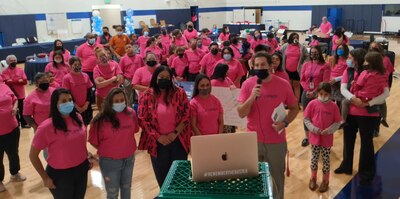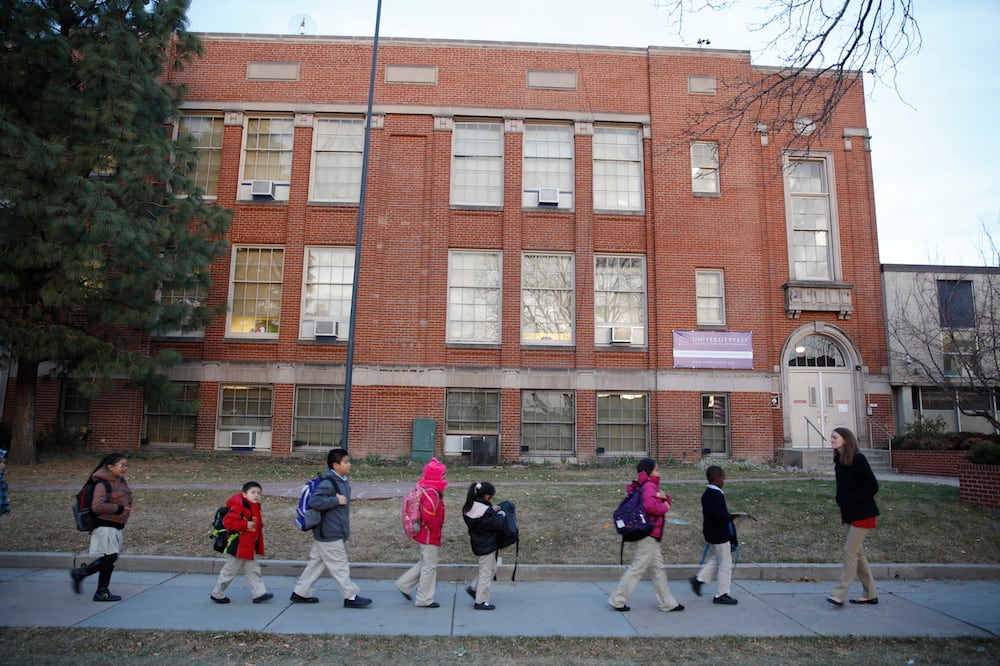In a split vote, the Adams 14 school board Tuesday night approved opening a new charter elementary school, while refusing to assume oversight of an existing charter school.
The approved charter school is a University Prep elementary that will focus on creating preschool seats and will gradually expand through fifth grade. The school will put students on a path to a Seal of Biliteracy by offering courses in Spanish.
Board members who voted in favor in the 3-2 vote said they appreciated the charter taking time to work with families who live in Adams 14 to create the school.
David Singer, the leader of University Prep, which also operates two schools in Denver, said his schools already served many families living in Adams 14 who drive their children to attend University Prep in Denver. So, he said, charter school leaders started working with parents in the spring to design the elementary school.
“They’ve worked closely with our community members, some who do attend University Prep right now,” said Adams 14 board President Ramona Lewis during the virtual meeting. “Bringing this school into our community can strengthen our community by bringing kids back.”
The charter school would open with preschool for 3- and 4-year-olds, as well as kindergarten in August, and then would add one grade level per year after that, until reaching preschool through fifth grade.
The board’s approval hinges on conditions that still need to be negotiated with University Prep.
Among them, the charter organization wants the district to offer transportation and food services. Some Adams 14 board members expressed concern that those details haven’t been figured out yet.
The two board members who voted against the University Prep school were Janet Estrada and new member James Amador.
Estrada, a bilingual teacher, said that while she was impressed with the application’s details about how it would serve English learners and its commitment to hire teachers of color, she was concerned that the district needed to direct its resources to improving existing schools before taking on the challenge of managing a charter school.
She also said she worried about creating a strain like the one that Denver Public Schools faces, where the district opened many charter schools and faces divided communities and closed schools.

After the board vote, Susanna Pasillas, a parent leader with University Prep, expressed thanks in a released statement.
“We all worked incredibly hard and spent endless hours dedicating ourselves to the children of Commerce City that our proposed school will serve, including my own child,” Pasillas said. “I am beyond thankful that the Adams 14 board approved our proposal and is giving us the chance to show the community what U Prep is made of.”
The last time a charter school applied to operate in Adams 14 was in 2018 when the charter network KIPP worked with parents to design an elementary school focusing on bilingual education. The school board at the time denied the application. It was just before the State Board of Education ordered the district to hand over its management to an outside company.
The district has been under external management since the summer of 2019.
In ordering actions to lift up a low-performing school or district, the state has limited options. One is to turn schools into charters, a possibility that’s back on the table at least for one district elementary school, Central. The State Board has said it would reevaluate the orders to improve that low-performing school in the spring.
The Adams 14 board also rejected an application on Tuesday in a unanimous vote with one member abstaining. That application was from Community Leadership Academy, a charter school seeking to switch its authorizer to the district from the state’s Charter School Institute.
The school founders told the Adams 14 board that despite their difficult past relationship with the district, they took a state suggestion to try to change authorization to the district. The idea was that if the charter were a part of Adams 14, the better test scores from charter students could help raise average district test scores — to pull the district off a state watchlist for struggling districts.
“What we said was that we were going to overlook the long list of transgressions,” to make it look “to the State Board, that the community is coming together,” said Ron Jajdelski, the director of the charter school.
The charter opened in 2005 under district authority after the state had to step in when Jajdelski claimed that district imposed conditions were illegal. The state agreed and ordered the district to renegotiate. After a few years under district management, more problems prompted the school to switch to operate under the Charter School Institute’s authorization. The district and the school again were at odds when the school expanded and Jajdelski said publicly he wanted to enroll about half of Adams 14’s students to pull them from failing conditions.
The charter serves approximately 700 students in preschool through 12th grade.
The Community Leadership Academy school often outperforms Adams 14 and the state in test scores. In 2019, for instance, 48.1% of school’s third graders met or exceeded expectations for reading, compared with 41.3% of third graders who did across the state.
Jajdelski said he did not want to rehash old arguments, but Adams 14 board members nonetheless raised concerns about past issues between the district and the school. Those included comments and signs the school has posted that negatively depict the district in an attempt to enroll students.
The board also raised concerns about past issues that have been raised by parents about their children being punished for speaking Spanish, and being pushed out of the school. Jajdelski denied that any student had ever been punished for speaking Spanish, but said the school had a new legal team that has changed policies in recent years.
Board members said they were concerned about the charter school’s English-only immersion model, but suggested that in the future, if the school could repair its relationship with the district, the board might be more open to reauthorizing the school.
Community feedback that Adams 14 gathered included several similar complaints about Community Leadership Academy’s practices. More than half of the 75 comments, and 47.5% of survey responses opposed the district accepting Community Leadership Academy’s application.
In the same survey, 53.8% of respondents favored accepting the University Prep charter school application, as did 34 of the 58 comments submitted.
The district accountability committee which reviewed both applications and submitted recommendations, however, had suggested the opposite actions that the board ultimately took: to approve the Community Leadership Academy school with conditions, and instead reject University Prep.






